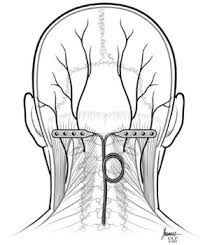Occipital nerve stimulation (ONS) has been reported to relieve refractory (difficult to treat) migraine headaches. Results of a clinical trial of ONS for patients with refractory migraine was just published in the journal Cephalalgia. This study was sponsored by St. Jude Medical, company that manufactures occipital nerve stimulators. This was a large (157 patients) and very scientific (randomized, controlled) study.?Patients were considered refractory if they failed two prophylactic migraine medications, such as blood pressure medications, anti-epilepsy drugs, or anti-depressants. Of the 157 patients, 105 patients had real stimulation and 52 had sham stimulation. The primary endpoint was a difference in the percentage of responders (defined as patients that achieved a ?50% reduction in pain scores after 12 weeks). The researchers found no significant difference in the percentage of responders in the Active compared with the Control group. The authors of the report suggest that had they used different measures of efficacy, the results would have been positive and they are calling for more studies. The most common adverse event was persistent implant site pain, which occurred in 15% of patients. The editorial by Hans-Christoph Diener, one of the leading headache experts suggested that the efficacy of this treatment appears to be very low, while side effects and costs are quite significant. The cost of the stimulator and of the surgery to implant it ranges from $20,000 to $40,000. Another problem with the study is that it did not require that patients fail Botox injections before they were enrolled in this trial. Botox is known to be effective for the treatment of migraine headaches in many patients who fail prophylactic medications. Botox is not only very effective, but is also significantly cheaper and much safer.

.png)


